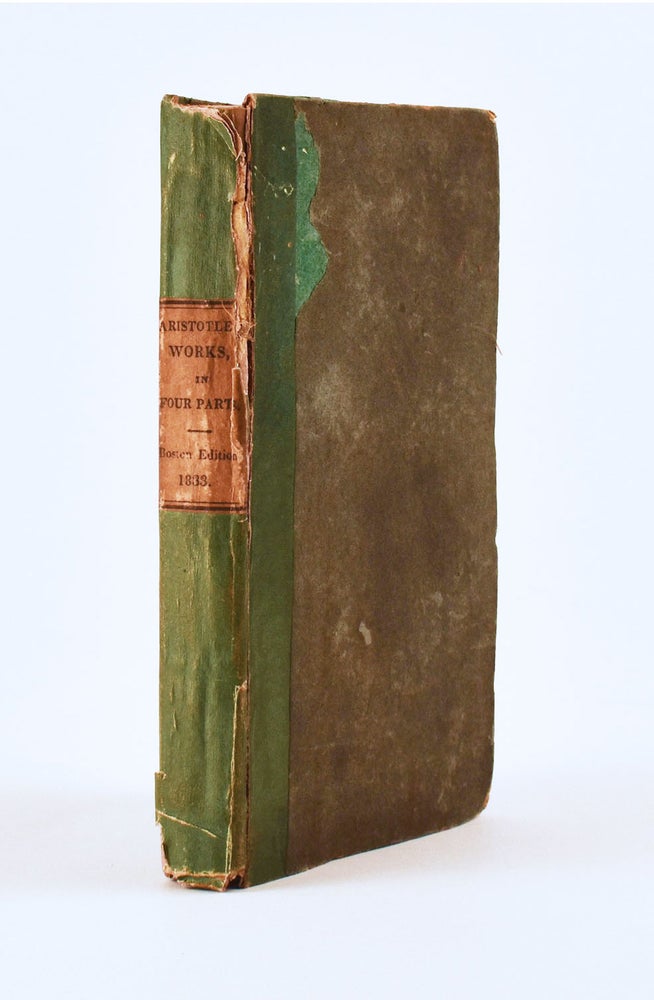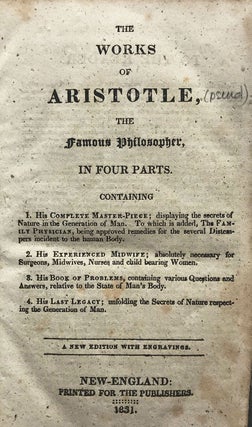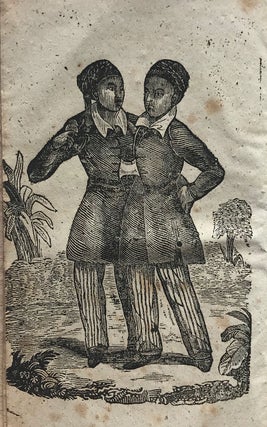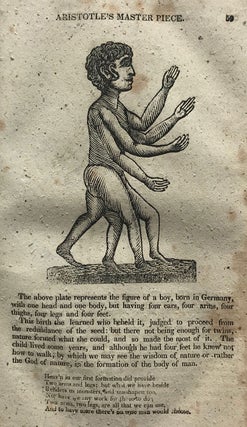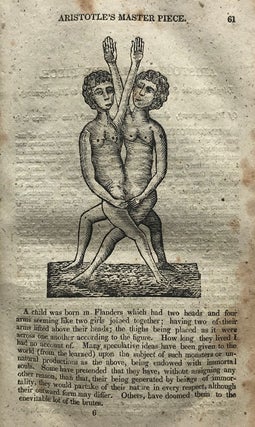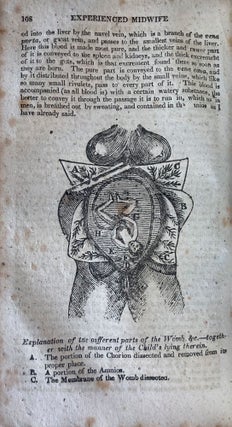The Works of Aristotle, the famous philosopher, : in four parts. : Containing 1. His Complete Master-Piece; displaying the secrets of Nature in the Generation of Man. To which is added, The Family Physician, being approved remedies for the several Distempers incident to the human Body. 2. His Experienced Midwife; absolutely necessary for Surgeons, Midwives, Nurses and child bearing Women. 3. His Book of Problems, containing various Questions and Answers, relative to the State of Man’s Body. 4. His Last Legacy; unfolding the Secrets of Nature respecting the Generation of Man. — A new edition with engravings.
[Boston] New-England: Printed for the publishers, 1833, 1831. 24mo (6” x 3.125”), orig. blue sugar-paper covered boards, green paper spine with orig. paper title label at spine: “Aristotle’s Works, In Four Parts. Boston Edition, 1833.” Frontis. wood engraving, 247 pp., addit. wood engravings. Later pencil annotation on title page. CONDITION: Good, boards soiled and edge-worn, some loss of paper at upper left of front board revealing spine paper beneath, paper cracked at hinges; contents very good with light foxing throughout. An 1833 Boston edition of this immensely popular treatise on human sexuality, with three companion tracts. The Works of Aristotle is a fascinatingly diverse volume, its four sections running the gamut from titillating accounts of emerging adolescent sexual desire and step-by-step guides on how to conceive a specific gender of child, to advice for difficult births, treatments and descriptions of “the several Maladies incident to the womb,” and brief answers to an enormous range of questions—from why smells are milder in winter to why men have more teeth than women. Born of a competitive glut of pregnancy and midwifery books in the 17th Century, Aristotle’s Master-Piece outlasted its contemporaries and underwent numerous editions and printings over the next 200 or more years, first in England and then in the United States. Additional texts joined the original treatise, and the collected “works of Aristotle” containing the four tracts offered here was first published in 1752. Probably owing to the 1595 co-opting of his name in a question-and-answer sex ed book, “‘Aristotle’ was widely regarded as a sex expert in early modern England,” his name came to offer the double reassurance of coital expertise and Classical wisdom (Fissel, p. 47). As medical knowledge advanced in the 20th Century, the texts became less a successful amalgam of contemporary medical wisdom and more a relic of soft porn and a back-street introduction to sex—as R. G. W. Vail put it, “what a young puritan ought to know.” Particularly fascinating about the Master-Piece is its treatment of “monster births”: this volume includes depictions of a child completely covered in hair, two sets of conjoined twins, and a child with four arms and four legs. These monstrous births, and indeed all undesirable traits in children, are consistently traced back to the parents’ mistakes, either in their copulation procedure (all the more reason to follow the book’s directions) or their mental states: “the imaginative power at the time of conception, is of such a force as to stamp a character of the thing imagined upon the child; thus a woman at the time of conception beholding the picture of a blackamoor, conceived and brought forth a child resembling an Ethiopian”; likewise, “the undue coition of a man and his wife when her monthly flowings are upon her; which being a thing against nature, no wonder that it should produce an unnatural issue…or, if they should not always produce monstrous births, yet are the children thus begotten, for the most part dull, heavy, sluggish, and defective in understanding, wanting the vivacity and liveliness which those children are endued with who are begotten when women are free from their courses.” The Book of Problems roams beyond sexuality, reproduction, and the human body to address such questions as: “Why doth a man gape when he seeth another gape”; “Why do some beasts want necks as serpents and fishes”; “Why do men desire to be had in memory after death” (the answer to which is dispatched in one neat sentence); and “Why does Aristotle use exceeding brevity in most hard matters.” In order to avoid prosecution under obscenity laws, publishers often printed “Aristotle’s” tracts with vague imprints. This edition’s “New-England” imprint, lacking a publisher’s or printer’s name, is typical, but it is supplemented by a paper label on the spine identifying it as the 1833 “Boston edition.” OCLC lists just one copy, at AAS. REFERENCES: Fissell, Mary E. “Hairy Women and Naked Truths: Gender and the Politics of Knowledge in ‘Aristotle’s Masterpiece,’” The William and Mary Quarterly, vol. 60, no. 1 (2003), pp. 43–74; Vail, R. G. W. “Report of the Librarian,” in the Proceedings of the American Antiquarian Society, Oct. 1939, pp. 248–292.
Item #7587
Price: $850.00


